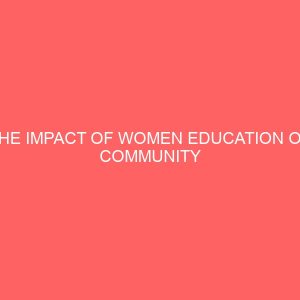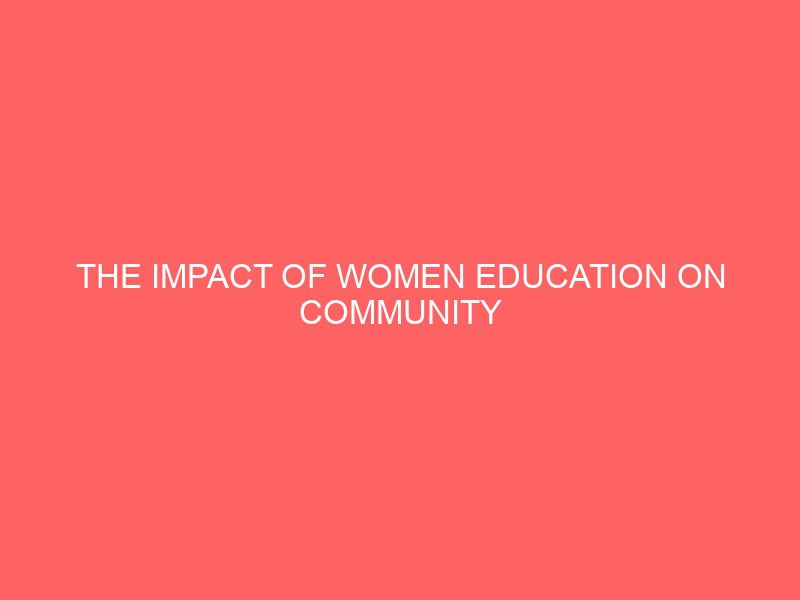Description
CHAPTER ONE
INTRODUCTION
1.0 BACKGROUND/OVERVIEW OF THE STUDY
The project aims at identifying the impact of women education on community development in Mbaitoli local government Area of Imo state. The education backwardness of females. In this domain has parents attitudes towards the education of the girl children, parent socio economic background, the unresponsive attitude of females themselves towards education, certain aspects of the culture of the people and government education policy in the area of study. In the whole, a lot is invested on education in the belief that education is basic to national development progress.
The federal and state government of Nigeria place high premium on education they recognize the fact that education is a weapon against ignorance, disease, squalor unenlightened Living and industrious citizenry capable of producing a prosperous nation more especially among the women folk. No wonder an adage says Train a man, you Train a soul Train a woman you Train a nation the Nigeria government taxes organization of the importance of education when it stipulated in the policy on education (1977) that education is the confide right of every Nigerian child, respective of real or marginal disability, this means that the females child is not life out.
In a nutshell, woman education helps woman to play many of the modern roles in the society unity and society at large. Without education the society will still be backward and will look like a mirage and it will be worst when more than half of the society members which is the women group are not educated.
1.2 HISTORICAL BACKGROUND OF THE STUDY
History is said to thrive in controversy and this is inevitable because of nature of the discipline. No history about a man and his society written or tap by a man is unflawed by personal understanding and judgment. Oral history and to lesser extent written history must as a ruler be fair to a section of those concerned while at the same time being unfair to others, thus the reconstruction and documentation of historical events have been bedeviled by a myriad of controversies, these without documented or written history. This is the case with the history of people of Mbaitoli and Igbo?s in general. No. historical question arouses more interest among. Present day Igbo?s that the inquiry where the Igbo?s come from.
The area known Mbaitoli Local Government Area in Imo State of Nigeria has nothing in existence to the best of our knowledge by way of a permanent publication as the cult antic origin or history of the people of Mbaitoli as at the year 2000. The people of Mbaitoli have no history of a common notable ancestry. But the origin and history of the component town that make up Mbaitoli abound, and some dates back to 4000 year ago. Before the coming of the white men, there was no Mbaitoli and each of the nine community existed long before the advent of colonnade masters. Between 1930 and 1932, major Stephenson the district officer for Owerri division became anxious for decentralization of traditional authority Mbaitoli and Ikeduru were amalgamated in a federal council in 1957 and in October 1958, Mbaitoli separated and established Mbaitoli district council with this arrangement, Mbieri native court dispensary and postal agency came into existence until 1958 when the name was changed to Mbaitoli. It remained a country council until the first military coup data in 1966.
The fight for an autonomous local government are for Ikeduru never rested, never slept and look risks in the pursuit of Mbaitoli division. The principle problem was as a result of abundance of resource persons and the materials wealth found in Mbaitoli but the Mbaitoli resource persons. Swore not to rest until Mbaitoli was liberated. These include: Barr. G.U. Osuji, C.N, Egbuchulam, Nkwokorie, Ogbubie. Some of these people shuttled between Mbaitoli and Enugu almost every week to the then administrator of east central State, Mr. Ukpabi Asika at Enugu, Enoch Chukwurah, Barr. Comel .O. Nwosu etc. joined and led the delegates from Mbaitoli division was created in 1973 by the Ukpai Asika Head Government of East Central State.
1.2 STATEMENT OF THE PROBLEM
The modernization of traditional people for many years has formed one of the major problems to our national government and political leaders. It is Impossible for a developing country like Nigeria to make a meaningful head way to wards the realization of developing while the bulk of its people continue to live in the past many communities in Mbaitoli local Government Area still place more importance on male education more than female education. They believe that training a woman is a waste of time and money seem their education ends in kitchen. This has indeed been a big problem to the nation at large and the community in particular because it has greatly hindered development.
No country or nation can grow without the backing and contribution of women. Women are the pillars of the house, kindred, village, community and the entire society. Education in Nigeria does not allow women who form more that half of the population the opportunities to fulfill their potentials as unique and important individuals deserving respect. A modern nation and community reeds individuals who can take active part in public affairs, who are able to exercise their right and performed their duties effectively. It is then very ridiculous and at the same time puzzling when the political leaders talk of national liberation when more than half of the population (Women) are in bondage of illiteracy.
1.3 OBJECTIVES OF THE STUDY
It is a know fact that women in Nigeria today are more educated than in the past. Women education is well acknowledge and appreciated due to the immense benefit the immediate family as well as the society at large.
Education of women has been observed in recent time as his/her girl child. It is commonly stated that when woman do not get the same education as men the stated instead of being a whole is reduced to a half the level of a women?s education determine herself realization human relationship, economic efficiency and civic responsibility.
The recognition of the need to educate women not with standing, Women up till today are regarded as the second class citizen in operational terms the objectives of the study include.
(1) To trace the problems of women education and find out the problem benefit that can acme from the education of women for the development of the community.
(2) To suggest possible implication of the findings to the study.
(3) To identify the factors that give rise to these problems.
(4) To make recommendation on factors that can contribute to positive solution of these problems.
(5) Changing social attitudes and community practices by active participation and involvement of both man and women.
(6) Equal access to women to healthcare, quality education at all levels and vocational occupational health and safety, social security and public office etc.
(7) Equal access to participation and decision making of women in social, political and economic life of the nation.
(8) The de-jury and se-facto enjoy meant of all human rights and fundamental freedom by women on equal basis with man in all sphere political, economic, social, cultural and civil.
(9) Building and strengthening partnership with civil society, particularly women?s organizations.
(10) Creating an environment through positive economic and social policies for full development for women to enable them to realize their fill potential.
1.4 SIGNIFICANCE OF THE STUDY
This research work will bring in to focus the place of women?s education on community development more especially in Mbaitoli local Government Area and the entire designing future education policies to meet the needs of all areas with in its Jurisdiction.
1.5 SCOPE OF THE STUDY
These are twenty seven local government areas in Imo State who can be investigated upon but for the sake of this research work the scope will only focus on Mbaitoli Local government area which comprise of nine communities with in it?s areas of jurisdiction.
1.6 RESEARCH QUESTIONS
For the purpose of this study the following research question were form dated.
(1) To what extent has the education acquired by women helped in the police economic and social development of society?
(2) Does the education acquired by women help in the proper up bringing of their children there by enhancing community development of society.
1.7 LIMITATION OF THE STUDY
In consideration of the limited time, money and the problems of extensive travel, it was decided that the subject should be drawn from one seven (7) villages in Mbaitoli local government Area. This means that the sample is not wholly representative. In addition, there was the willingness of some respondents to fill the question despite some persecutions. In personal interview too, attempts were made to get certain individuals to respond while some bluntly refuse any interview.
1.8 DEFINITION OF TERMS
With the context of this study, of the following terms should be understood in the same way.
(1) Education: According to Funlis and vag-nalls (1978) defined education as the development of the whole native of man physical intellect oral and moral through interaction within every phrase of his environment. They stressed that two distinctive phrase are involved in education process.
(a) The individual
(b) The adjustment to his social environment and the interest of his society as a whole.
(2) Community: According to Ihejirika, community is a group of people of different backgrounds, identity, cultures, religion race, occupations, living in one place, distribute or country with shared attitude and interest. Differently but a community is there fore a group of people who live in a particular area and have common affinities with which they are easily identified.
(3) History: History is account of the past which seck seek to provide reasons why things happened the way they did.
(4) Development: Development involves changes certain places from simplicity to complexity. It implies a progressive change in development and growth. Development is progressive in nature.
Chauhan (1978:51) said that development follows on orderly sequence and a continuous process. Therefore, development in a community implies a change of certain basic amentias in that community which there by improve the standard of living of the people in that community.
(5) Community development: The united nations in 1956 defined community development as the process by which the efforts of the people are united with those of the government authorities into the life of the nation and enable them to contribute fully to the national progress.
Generally, the philosophy behind community development is to enhance the quality life of the people of the locality through the improvement of their poverty level, literacy level, ignorance and general standard of living of the rural dwellers







